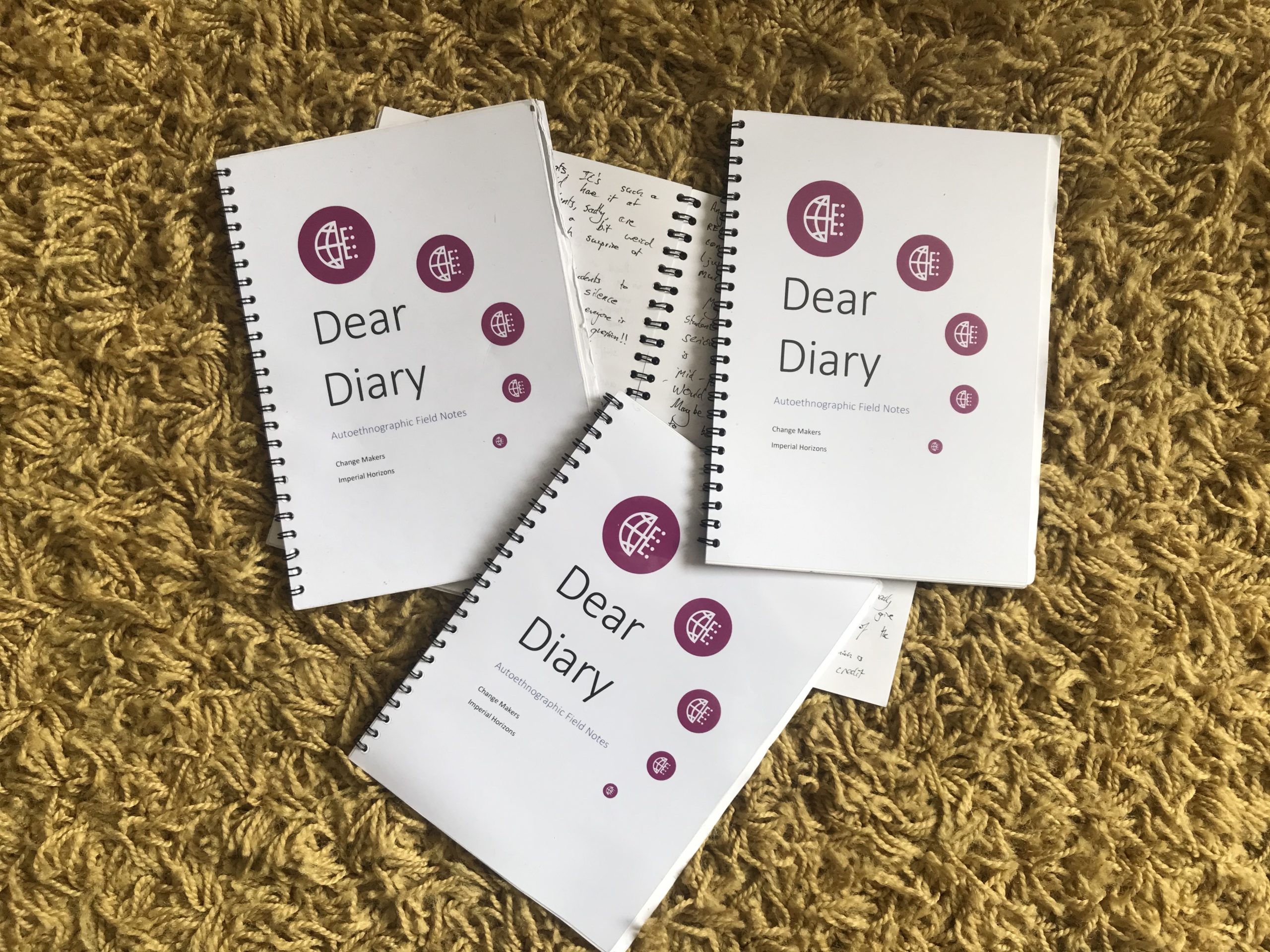This research project was funded by Imperial Student Shapers and the project leader was Dr Elizabeth Hauke, Principal Teaching Fellow, Field Leader Change Makers.
The staff and student partners included Elizabeth Hauke, Mark Pope, Daisy Pataki, Federica Bellizio, Omar Faqir, Sian Evans, Lee Nissim, Alexander Lipp, Enrico Manfredi-Haylock, Simone Zuffa, Rayan Zaffar, Aron Lajko, Jacob Billing, Johanna de la Cruz, Juhyung Lee, Rohit Thota, Alana Bralsford, Xiaoye Zhang and Katarzyna Zukowska.
Introduction
This project entails a partnership autoethnographic study capturing individual experiences of our first year Change Makers modules, with autoethnographers including staff, co-learners and student partners who will diary and share their experiences of the same module at the same time.
This project builds on prior staff-led research.
The Dear Diary Project aims to work with student partners to develop a 360-degree record of the experience of participating in our first year Change Makers module Global Challenges.
The project will capture experience from the teaching staff, the co-learners (similar to graduate teaching assistants) and the students.
This experience will be captured using a simplified version of autoethnography (where one captures the details of one’s own experience in an observational ethnographic style).
In this case, the ‘field notes’ will be in the form of a ‘semi-structured diary’, that each participant will complete on a weekly basis. At the end of the module, each participant will create an ‘account’ that draws from their diary and relates a story of a particular aspect of their experience that the participant wants to share. The account may be produced in any format or medium – it could be a written account, a video, a presentation, a poster, a painting or another medium of the participant’s choice.
Aims
The aims of this project are two-fold – firstly to gather the most detailed, complete and specific personal account(s) of a shared learning experience in order to find out more about how the module works and is experienced.
Secondly, this is a methodologically innovative work that has not been attempted before. It is based on preliminary work completed by the lead staff partner, who has extensive experience of embedded ethnography and autoethnography, but collective autoethnography of a shared experience is novel and will deliver new insights into the value of this type of highly qualitative work.
Method
Following an initial briefing, introduction to the aims of the research and to the ethical considerations of this project, the lead staff partner will deliver some training on the specifics of autoethnography and the type of observation, note taking and writing that is involved.
All participants will be introduced to the Field Notes diaries that will include prompts to help participants get started with recording their experiences, and to introduce some consistency across the diaries as to what is considered when making the Field Notes (for example, for each class, there will be the prompts – see, hear, think, feel, do – to help each participant consider these different aspects of their experience, although they might choose to focus on something particular to them for their fuller notations).
All participant partners will be aware that they will be producing an account that will be shared publicly in their name, but that all the accounts and field work diaries will also be shared anonymously for secondary analysis and external dissemination.
Ethical approval for this work was granted by EERP, Imperial College.
Outputs
Following the commencement of the research project, it was agreed amongst all research partners, that the initial outputs would be shared publicly and attributed to individual researchers. Further research outputs will be include anonymised data.
The initial Dear Diary Outputs can be accessed below or via the menu at the top of the page.
Connections, Undergraduate Student (Poster)
Listen Learn, Co-Learner (PhD Student) (Dance)
Together, Undergraduate Student (Cartoon)
What’s It Like, Undergraduate Student (Phone Conversation)
Rhythms of Education: Changing The Tempo, Teaching Fellow (Video Collage)
Waltz of the Change Makers’ Chairs, Teaching Fellow (Stop Motion)
Oscillator, Co-Learner (PhD Student) (Computer-generated graphic)
Inbetween , Co-Learner (PhD Student) (Memes)
The Garden of Pedagogic Delights, Co-Learner (PhD Student) (Digital Collage)
Different Lights, Undergraduate Student (Digital Collage)
Everything is Connected, Undergraduate Student (Poster)
It’s A Cat’s Cradle, Principal Teaching Fellow (Performance Art)
Change the World, Co-Learner (PhD Student) (Cartoon)
Colourful Building Bricks, Undergraduate Student (Installation)
The Human Error, Undergraduate Student (Digital Poster)
Down to Interpretation, Undergraduate Student (Poster)
Creativity, Co-Learner (PhD Student) (Digital Poster)
Secondary analysis of the data collected will take place over the coming academic year.
Note on the impact of Covid 19
The global pandemic interrupted this piece of research following the initial data collection period.
The lockdown was implemented prior to the production of the final outputs, and led to almost all researchers becoming geographically separated from their physical field notes diary (they were locked in offices and labs, and left in halls of residence). In many cases access to the diaries has still not been possible.
We had also intended to run two workshops to facilitate and inspire the production of the initial outputs, but were unable to offer these in person due to the lockdown. We were not able to meet as a single group due to the range of time zones in which we find ourselves, and so had three smaller online sessions to share ideas for the final outputs.
The outputs were initially designed to be shared at a public seminar and viewing event. A selection of researchers would have given brief introductions to the work and to their own experiences and the production of the output. The outputs would then have been displayed/performed at a reception following the seminar with the audience able to interact with the researchers and the outputs.
Once the diaries have been collected and anonymised, secondary analysis will commence from the diary data. Secondary analysis can begin on the collection of outputs as a further data source.
